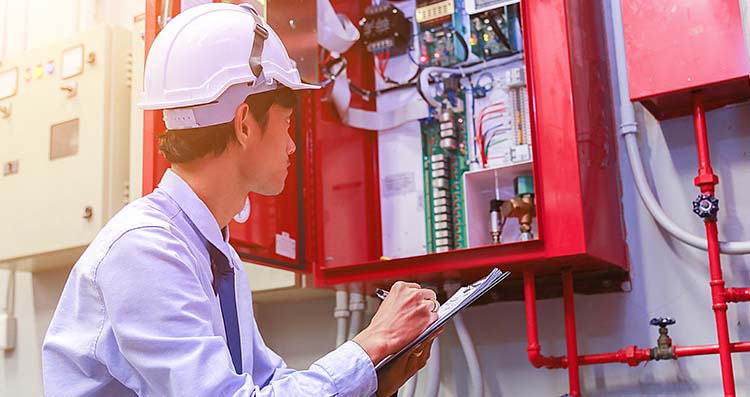(Fire)-safe working during the summer: start with 3 questions
Sunlight is not only good for our well-being, but in our workplace as well. However, the accompanying heat on summer days also brings risks. Not only do employees need to be protected, but extra attention to certain products used while working is also required. These 3 questions will help you on your way.
Question 1 - Do you use flammable or hazardous substances in your work? Keep them away from heat.
Flammable and hazardous substances, gas cylinders, aerosols, etc. Based on your risk analysis, you know how to handle them safely. But they require extra attention during the summer months.
Take into account, among other things:
- Ventilation: Ensure adequate ventilation in areas where hazardous materials are stored to prevent accumulation of hazardous vapours.
- Temperature control: Monitor temperatures in storage areas regularly, especially during hot periods. Set alarms that warn of excessive temperatures.
- Protective storage: Use special fireproof cabinets or storage containers for hazardous materials. These are designed to regulate the temperature and prevent these substances from overheating.
- Shade and insulation: Place materials stored outside in shade or use reflective covers to reflect sunlight and keep temperatures down.
- Emergency procedures: Ensure that clear emergency procedures are in place in case something does go wrong. This includes fire extinguishers nearby, emergency exits and a clear plan for evacuation and first aid.
Waste containers: prevent self-ignition
Due to a chemical reaction, sawdust, cleaning cloths with linseed oil and organic material can heat up so much that they smoulder or even catch fire. Consequently, it is important to ensure that your containers are emptied before going on holiday. If that is not possible, place them in a completely sealed area at least ten metres from your business premises, preferably in the shade.
Question 2 - Working outside or outdoors? Protect your personnel against the heat.
From a sunburn or heat stroke to an increased risk of skin cancer: working outdoors on summer days mean that your employees will be exposed to risks. Inform them preventively how they can protect themselves, and also provide them all the appropriate tools they need in order to work safely (e.g. headgear, long-sleeved clothing, plenty of cold drinks).
The temperature in your offices, workshops, warehouses and other indoor spaces can also increase significantly. But when is it too hot to work? That depends on the physical workload. The occupational physician will decide how heavy the workload is. The physical workload must be viewed in the context of a maximum Wet Bulb Globe Temperature (WBGT).
Download our free infographic
The WBGT value can be determined using a wet bulb thermometer or 'wet bulb globe'. Such measuring devices not only takes the temperature into account, but the humidity and radiant heat of objects as well.

Question 3 - Summer regime for your company? Check all electrical equipment and batteries.
Your company may possibly be shut down for a few weeks or may switch to a minimum staffing level. Always turn off all electrical equipment not in use by your employees, and pull the plugs out of the socket. This will prevent short circuits, overheating or lightning damage. Lithium-ion batteries should definitely not be left in their chargers for long periods. Incidentally, were you aware that there are special fireproof cabinets for the safe storage of batteries?
Finally: know what to do if it does go wrong
Suppose a fire breaks out. Or one of your people urgently needs care, for example due to heat stroke or burns. If so, you had better be well prepared. A good risk analysis, the necessary preventive measures and sufficient attention to first aid and fire fighting are indispensable on every work floor.
With a well thought-out risk management plan, tailored to your company, your employees can get to work safely. And thanks to our targeted training courses in fire prevention and fire-fighting or to first-aiders, you will always have an employee nearby who knows what to do in an emergency.